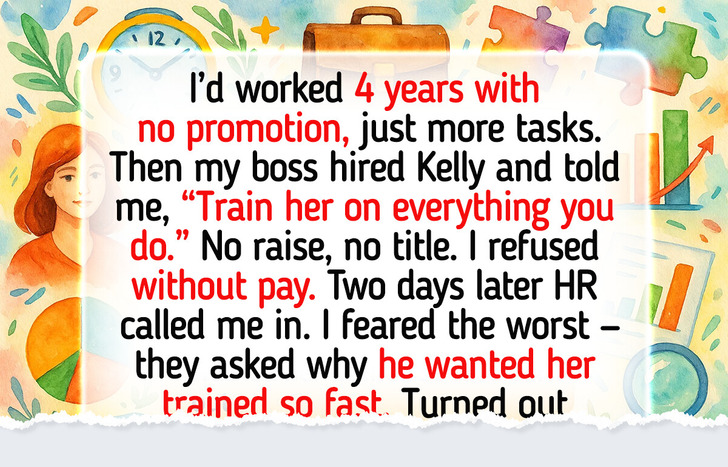I Let My Kids Play Outside Alone and Child Services Showed Up at My Door


We’ve all heard it: “Be a team player, just help out.” But sometimes “helping out” really means doing someone else’s job for free. One of our readers found herself in exactly that spot — years of great results, no promotion, and suddenly her boss wanted her to train a brand-new hire... without so much as a thank-you, let alone extra pay. What happened when she pushed back left her stunned — and HR right in the middle.
“Hi Bright Side team,
I’ve been at my company for four years. Despite great results, I never got a promotion — just more work piled on. Last month, my boss introduced a new hire, Kelly, and casually said, ‘You’ll train her on everything you do.’ No raise, no title, just double the work.
I pushed back: ‘Happy to help her get started, but full training isn’t in my job description. If you want me to take that on, I’d expect a promotion or at least a pay adjustment.’ My boss wasn’t happy.
Two days later, HR called me in. I braced for the worst — but instead, they asked why I thought my boss wanted me to train Kelly so quickly. Turns out, upper management suspected he was planning to push me out and slot her in at a lower salary.
HR said they’d been watching, and my refusal gave them the red flag they needed. A month later, my boss was ‘reassigned,’ Kelly was moved under someone else, and I got an offer for an actual lead position — with a raise this time.”

👉 If you earn minimum wage (or close to it):
Your employer must pay you for training hours. Otherwise, your total pay could slip below the legal minimum — and that’s not allowed.
👉 If you earn above minimum wage:
Things get a little trickier. Sometimes training is already considered part of your pay. If it happens outside your regular hours, check your contract. If it’s unclear, talk to your manager or HR to confirm.

Many people feel demoralized when they invest time and expertise (often developed on their own) only to have the company expect them to train others without gratitude or compensation. This decreases motivation and can lead to burnout. The “overjustification effect” also warns that external demands (without reward) can reduce one’s intrinsic motivation.
The World Health Organization and other mental health experts point out that excessive workload without fairness or support is a major risk factor for poor mental health at work. Being required to train extra without compensation adds to that burden.
At the end of the day, training someone shouldn’t mean training away your own worth — the best workplaces are built on fairness, recognition, and respect.
I Refused to Let Coworkers Steal From Me—Maybe I Overreacted











